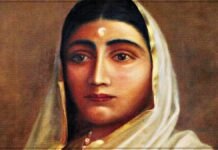
Devi Ahilya Bai Holkar was a remarkable queen of the Maratha Empire, who ruled over the Malwa region from 1767 to 1795. She was known for her piety, generosity, courage, and administrative skills. She built many temples, ghats, wells, and roads across India, and patronized arts and culture. She was respected by her subjects as well as her enemies and was called ‘Devi’ by the people. Today is her 228th death anniversary, or punyatithi, which is observed with reverence and gratitude by her admirers.
Devi Ahilya Bai Holkar was born on 31 May 1725 in Chaundi village of Maharashtra, to Mankoji Shinde, a Dhangar (Gadariya) Patil. She was married to Khande Rao Holkar, the son of Malhar Rao Holkar, a prominent Maratha general and ruler of Malwa. She accompanied her husband on many military campaigns and learned the art of warfare and governance from him and her father-in-law. She also received education in reading and writing from her father. She became a widow at the age of 29 when her husband died in the battle of Kumher in 1754. She was prevented from committing sati by her father-in-law, who recognized her potential and appointed her as his successor.
After the death of Malhar Rao Holkar in 1766, Devi Ahilya Bai Holkar became the regent of Malwa, with the support of the Peshwa and other Maratha chiefs. She shifted her capital from Indore to Maheshwar, a town on the banks of the Narmada River. She established a council of ministers and entrusted them with various departments of administration. She personally supervised the treasury, the army, and the judiciary. She maintained cordial relations with other Maratha rulers, as well as the Rajputs, the Sikhs, the Jats, and the Nizam. She also defended her territory from the invasions of the Afghans and the British.
Devi Ahilya Bai Holkar was a devout Hindu, who respected all religions and sects. She donated generously to various places of worship, such as Kashi Vishwanath Temple in Varanasi, Somnath Temple in Gujarat, Gaya Vishnupad Temple in Bihar, Dwarkadhish Temple in Dwarka, Rameshwaram Temple in Tamil Nadu, Badrinath Temple in Uttarakhand, and many more. She also built several temples in Maheshwar, Indore, Ujjain, Omkareshwar, Nashik, Haridwar, Mathura, Ayodhya, and other places. She constructed ghats along the rivers Ganga, Yamuna, Narmada, Godavari, and Kaveri. She dug wells and tanks to provide water to the people. She opened free food stalls (annakshetras) for the poor and pilgrims. She appointed scholars and priests to conduct religious ceremonies and discourses in the temples.
Devi Ahilya Bai Holkar was also a patron of arts and culture. She encouraged music, dance, literature, painting, and sculpture in her court. She invited many artists and poets from different regions to showcase their talents. She also promoted education and learning among her subjects. She established schools for boys and girls, where they were taught Sanskrit, Marathi, Persian, and Arabic languages, as well as mathematics, astronomy, astrology, medicine, law, history, geography, and ethics. She also supported women’s empowerment and welfare. She abolished child marriage, female infanticide, widow remarriage prohibition, and other social evils. She gave equal rights and opportunities to women in all spheres of life.

Devi Ahilya Bai Holkar died on 13 August 1795 at the age of 70 in Maheshwar. She was cremated on the banks of the Narmada river, where a memorial stands today. Tukoji Rao Holkar succeeded her as the ruler of Malwa. Devi Ahilya Bai Holkar is remembered as one of the greatest women rulers in Indian history. Her legacy is celebrated by various monuments, institutions, awards, festivals, stamps, coins, books, films, songs, and poems dedicated to her name. She is an inspiration for generations of Indians who admire her virtues of piety, generosity, courage, and administration.










































